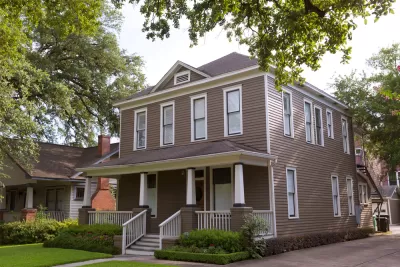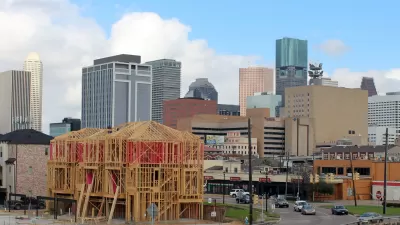In a victory for preservationists, the Texas Supreme Court upheld Houston's Historic Preservation Ordinance despite a lawsuit alleging that the ordinance constitutes illegal zoning rules.

Sara Bronin examines the long-held maxim that Houston, Texas is "zoning’s last frontier," a sprawling metropolis of essentially unregulated land uses, after a consequential ruling by the state's Supreme Court in a lawsuit that challenged Houston's Historic Preservation Ordinance as a form of de facto land use control, equivalent to zoning.
In a lawsuit named Powell v. City of Houston, two homeowners assert that the city's Historic Preservation Ordinance (HPO), “which requires covered property owners to submit plans for significant exterior changes to the city’s Archaeological and Historical Commission," constitutes a violation of "both Houston’s charter (which requires a citywide referendum to green-light zoning) and the state’s zoning enabling act (Chapter 211 of the Texas Local Government Code)."
According to the city, the HPO is not a zoning regulation. In arguing in support of the city's position, Bronin writes that "[z]oning and historic preservation law derive from distinct legal schemes and have different purposes." Unlike zoning, which regulates "uses, structures, and lots in distinctly-regulated districts," historic preservation is much less comprehensive than zoning and "largely protects a subset of built resources – historic resources – and usually applies to just a fraction of land within any particular jurisdiction."
The Texas Supreme Court agreed, ruling in June that "the ordinance does not implement zoning as that concept is originally understood, and therefore the City Charter’s limits on zoning do not apply," as the HPO "did not come close to citywide applicability, it did not subject regulated property to uniform standards, and it did not implicate uses."
The Court's decision "was a definitive victory for historic preservation, for the City, and for all Houston property owners who opted in to the HPO," letting "the city of no zoning" regulate land use in, at least, a piecemeal way.
FULL STORY: Houston: Still Zoning’s Last Frontier?

Study: Maui’s Plan to Convert Vacation Rentals to Long-Term Housing Could Cause Nearly $1 Billion Economic Loss
The plan would reduce visitor accommodation by 25,% resulting in 1,900 jobs lost.

North Texas Transit Leaders Tout Benefits of TOD for Growing Region
At a summit focused on transit-oriented development, policymakers discussed how North Texas’ expanded light rail system can serve as a tool for economic growth.

Using Old Oil and Gas Wells for Green Energy Storage
Penn State researchers have found that repurposing abandoned oil and gas wells for geothermal-assisted compressed-air energy storage can boost efficiency, reduce environmental risks, and support clean energy and job transitions.

Santa Barbara Could Build Housing on County Land
County supervisors moved forward a proposal to build workforce housing on two county-owned parcels.

San Mateo Formally Opposes Freeway Project
The city council will send a letter to Caltrans urging the agency to reconsider a plan to expand the 101 through the city of San Mateo.

A Bronx Community Fights to Have its Voice Heard
After organizing and giving input for decades, the community around the Kingsbridge Armory might actually see it redeveloped — and they want to continue to have a say in how it goes.
Urban Design for Planners 1: Software Tools
This six-course series explores essential urban design concepts using open source software and equips planners with the tools they need to participate fully in the urban design process.
Planning for Universal Design
Learn the tools for implementing Universal Design in planning regulations.
Ascent Environmental
Borough of Carlisle
Institute for Housing and Urban Development Studies (IHS)
City of Grandview
Harvard GSD Executive Education
Toledo-Lucas County Plan Commissions
Salt Lake City
NYU Wagner Graduate School of Public Service




























